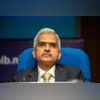Inflation to moderate from 4th quarter but global conflicts pose risks: Das
Balance between inflation & growth is well-poised, the Indian economy reflects a picture of stability and strength, said Shaktikanta Das
)
Shaktikanta Das reiterated that the Indian economy has rebounded from the severe contraction. (Photo: Shutterstock)
Listen to This Article
The inflation trajectory is likely to sequentially moderate from the last quarter of the ongoing financial year, Reserve Bank of India Governor Shaktikanta Das said on Saturday, while cautioning against risks to it by worsening geopolitical conflicts and unexpected weather events.
“The headline inflation trajectory is projected to sequentially moderate from the last quarter of this financial year. Unexpected weather events and worsening of geopolitical conflicts constitute major upside risks to the inflation outlook,” Das said at an event in Mumbai organised by the Peterson Institute for International Economics (PIIE).
While addressing a gathering at the ‘Macro Week 2024’, Das said, “The balance between inflation and growth is well-poised in India, and the Indian economy reflects a picture of stability and strength.”
Das highlighted that resilient growth of the Indian economy has given the RBI’s rate setting body --monetary policy committee -- space to focus on inflation so as to ensure its durable descent to the 4 per cent target.
The governor reiterated that the Indian economy has rebounded from the severe contraction imposed by the COVID-19 pandemic, and averaged a real GDP growth of above 8 per cent during the last three financial years. In FY25, the RBI has projected real GDP growth of 7.2 per cent, with risks evenly balanced around this forecast.
Also Read
“Improving domestic demand, lower input costs and a supportive policy environment, are spurring manufacturing activity. The services sector has been displaying strong growth. The growth outlook reflects the underlying strength of India’s macro-fundamentals, with domestic drivers – private consumption and investment – playing a major role,” Das said, adding that the government’s thrust on capex and healthy balance sheets of banks and corporates are expected to support private investment.
He also emphasised that private consumption -- the mainstay of aggregate demand -- appears to be on track for a strong improvement due to the favourable agricultural outlook and the pickup in rural demand. Sustained buoyancy in services would also support urban demand, Das said.
Meanwhile, Das also highlighted that the health parameters of Indian banks and non-bank financial companies (NBFCs) are very robust, and this has resulted in sustained credit flows, especially to the remote and underserved segments, bolstering financial inclusion.
Separately, Das highlighted six areas of priority for G20 countries and international monetary institutions. They are reforming the international financial architecture, debt restructuring mechanisms, improving global financial regulation, addressing the digital divide, economic fragmentation, and climate finance.
According to Das, the current system, while foundational, needs to reform itself to ensure equitable voice and representation for the emerging economies.
“Enhanced access to resources and a stronger role in the governance of institutions such as the International Monetary Fund (IMF) and the World Bank will not only enhance the legitimacy of these institutions but also foster more serious global cooperation in addressing macro-financial challenges,” he said.
Further, he highlighted that while the G20’s Debt Service Suspension Initiative (DSSI) and the Common Framework for Debt Treatments were commendable measures, the scale of the problem is much larger.
“We need an overhaul of the debt resolution architecture and its refashioning into one that involves both public and private creditors, ensures timely debt restructuring, and links debt relief with sustainable development objectives. Without such reform, the vulnerable countries will continue to face unsustainable debt burdens which will have repercussions for global financial stability,” Das said.
More From This Section
Don't miss the most important news and views of the day. Get them on our Telegram channel
First Published: Oct 26 2024 | 6:54 AM IST